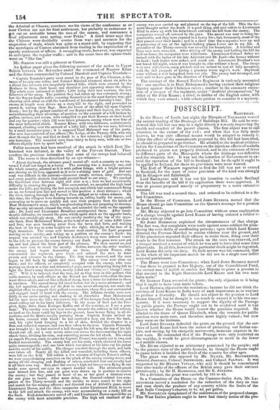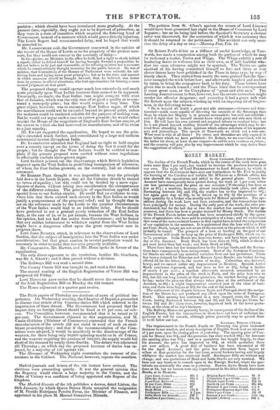POSTSCRIPT.
SATURDAY.
In the House of Lords last night, the Marquis of NORMANBY moved the second reading of the Drainage of Buildings Bill. He said he con- sidered this bill but one step in a right direction towards improving the health and comfort of the poorer classes. The first object was to call attention to the extent of the evil ; and when that was fully made known, he was sure effectual means would be adopted to remedy IL After the effect of the amendments proposed by this bill had been tried, he should be prepared to go further. He alluded to the medical evidence before the Committee of the Commons on the injurious effects of malaria produced in places not properly drained, and to the existence of fever in different parts of the Metropolis where the drainage was defective and the situation low. It was not the intention of Government to ex- tend the operation of the hill to Scotland ; but he thought it ought to be applied to Ireland, for there its provisions were most wanted.
The Earl of Wics.Low regretted to find the bill was not to extend to Scotland, for the want of some provision of the kind was strongly felt in Glasgow and Edinburgh. Lord Nenuesnic said it was not his intention to exclude Scotland from the benefits of the bill if its application there were approved. It was at present proposed merely as preparatory to a more extensive measure. '
The bill was read a second time, and ordered to be referred to a Se- lect Committee.
In the House of Commons, Lord Joint RUSSELL moved that the House should go into Committee on the Queen's message for a pension to Lord Keane.
Mr. Matz objected to go into Committee without some explanation of a charge brought against Lord Keane of having ordered a soldier to be shot without trial.
Sir JOHN HOIIHOUSE explained the circumstances of that charge. The fact was, that complaints were made against some soldiers for plun- dering the corn-fields of unoffending persons ; upon which Lord Keane directed the Provost-Marshal to station videttes near the ground, and if the plunderers repeated their offence to resist them, firing over their heads in the first instance. The attack on the corn was renewed, and a trooper received a wound of which he was said to have died some time afterwards. In all this, however the particular death might be regretted, Lord Keane did only his duty. So little severe was his command, that in the whole of his important March he did not in a single case inflict. corporal punishment.
The House went into Committee ; when Lord JOHN RUSSELL moved " that there be granted to her Majesty, out of the Consolidated Fund, the annual sum of 2,0001. to enable her Majesty to grant a pension to that amount to the Right Honourable Lord Keane and his two next heirs male."
Sir ROBERT PEEL seconded the grant ; the only objection to it being that it ought to have been made before.
Lord Howie): objected to the resolution ; because he did not think the services of Lord Keane in India were of such importance as to warrant so profuse a liberality. He should not object to the pension to Lord Keane himself, but he thought it too much to extend it to his two suc- cessors. If it were necessary to support the dignity of the Peerage by public grants, the Peerage ought not to be conferred until it was known whether the House would bestow the pensions required. He alluded to the times of Queen Elizabeth, when the rewards for public services were more rare, and therefore more highly valued ; but now they were on the increase.
Lord Tons RUSSELL defended the grant, on the ground that the ser- vices of Lord Keane had been the means of protecting our Indian em- pire, and saving, by his energetic movements, immense expense in fu- ture wars. He contended that if the Peerage were only conferred on the wealthy, it would be great discouragement to merit in the lower and middle classes.
-.Mr. HUME objected to an aristocracy pensioned by the people ; and 'in the present state of the public finances, he thought the House ought to pause before it lavished the funds of the country for after ages. The grant was also opposed by Mr. MutiTz, Mr. BnoraEn.row, General JOHNSON, Colonel SIBTHORPE, and Colonel SALWEY. It was supported by Sir HUSSEY VIvIAN, who said it should be remembered that nine-tenths of the officers of the British army gave their services gratuitously ; by Sir H. HARDINGE, and Sir R. JENKINS.
On a division, the grant was carried, by 195 to 43.
In a Committee of the House on the Customs-duties Acts, Mr. LA- BOUCHERE moved a resolution for the reduction of the duty on rum and ram shrub, the produce of any country within the limits of the East India Company's charter, to 9s. 4d. per gallon. Mr. GOULBURN dpmplained of the suddenness of the proposed change. The West Indian pAnters ought to have had timely notice of the pro- position ; which should have been introduced more gradually. At the present time, especially, they ought not to be deprived of protection, as they were in a state of transition which required the fostering hand of Government, instead of a measure which would prove directly injurious. The Lords Report had recommended delay, and he hoped that would be attended to.
Mr. LAuoucmeRE said, the Government concurred in the opinion of the report of the House of Lords as to the propriety of the present mea- sure, but they could not concur in the necessity of delay— In his opinion, no Minister, in the office he held, had a right to skulk behind a report, either to defend himself for having brought forward a proposition he did not believe to be just and reasonable, or for refusing to introduce a measure which he conscientiously thought necessary for the public interest. He was of opinion, that Committees of the Houses of Parliament were valuable for col- lecting facts and laying down great principles; but as to the time and manner in which measures should be brought forward, that, he believed, was better done by persons in official situations, who had opportunities for forming a more correct judgment on that point.
The proposed change would operate much less extensively and much more gradually upon West Indian interests than seemed to be supposed. Eventually, no doubt, the East Indian rum might compete with even that of Jamaica, which was the only rum of so good a quality as to com- mand a monopoly-price ; but this would require a long time. The great object, however, was to encourage East Indian sugar, of which the manufacture could not be extended beyond its present point, unless the molasses could be rendered saleable for the purpose of making rum. But he would not argue such a case on narrow grounds ; he would rather remind the House of the magnitude of England's East Indian empire, of the extent to which she had narrowed its manufactures, and of its claim to a just equality.
Mr. EWART supported the equalization. He hoped to see the prin- ciple extended much further, and consolidated by a large and uniform commercial system throughout India. Dr. LUSEUNGTON admitted that England had no right to hold empire over a country except on the terms of doing the best it could for the people ; but he thought the West Indians would be entitled to com- plain if the present proposal were carried without some regulations to effectually exclude slave-grown sugar. Lord SANDON pointed out the disadvantage which British legislation imposed upon the West Indies in prohibiting immigration of labourers; of whom the East Indian growers, on the contrary, had an abundant command.
Sir ROBERT PL.LL thought it was impossible to deny the principle laid down in the Lords Report, that all the Colonies should be treated ou terms of equality ; but this could not be decided by a mere equa- lization of duties, without taking into consideration the circumstances of the different colonies. The principle of equalization applied with special force to our Indian empire. He could find no evidence to con- vince him that there existed such slavery in the East Indies as would justify a postponement of the proposed relief; and he thought that to act on the reference made by the Lords to the peculiar circumstances of the West Indies would lead to an indefinite delay. But he should have preferred to see a gradual yearly reduction of the East Indian duty, at the rate of 2s. or 3s. per annum, because the West Indians, in his opinion, had not had due notice from Government ; and he feared that any sudden inducement to withdraw capital from the West Indies might have a dangerous effect upon the great experiment now in progress there.
Lord Joni,' RUSSELL stated, in reference to the observations of Lord Sandon, that the subject of immigration into the West Indies was under consideration ; but that great caution in several particulars would be necessary in order to make that resource properly available.
Mr. Coisamousr, Mr. HAWES, and Mr. HOGG spoke in favour of the equalization. The only direct opponent to the resolution, besides Mr. Goulburn, was Sir A. GRANT ; and it then passed without a division.
The Railways Bill was read a second time.
The County Courts Bill was brought in, and read a first time.
The second reading of the English Registration of Voters Bill was postponed till Friday.
Lord MORPETH gave notice that he should move the second reading of the Irish Registration Bill on Monday the 22d instant.
The House adjourned at a quarter past twelve.



























 Previous page
Previous page